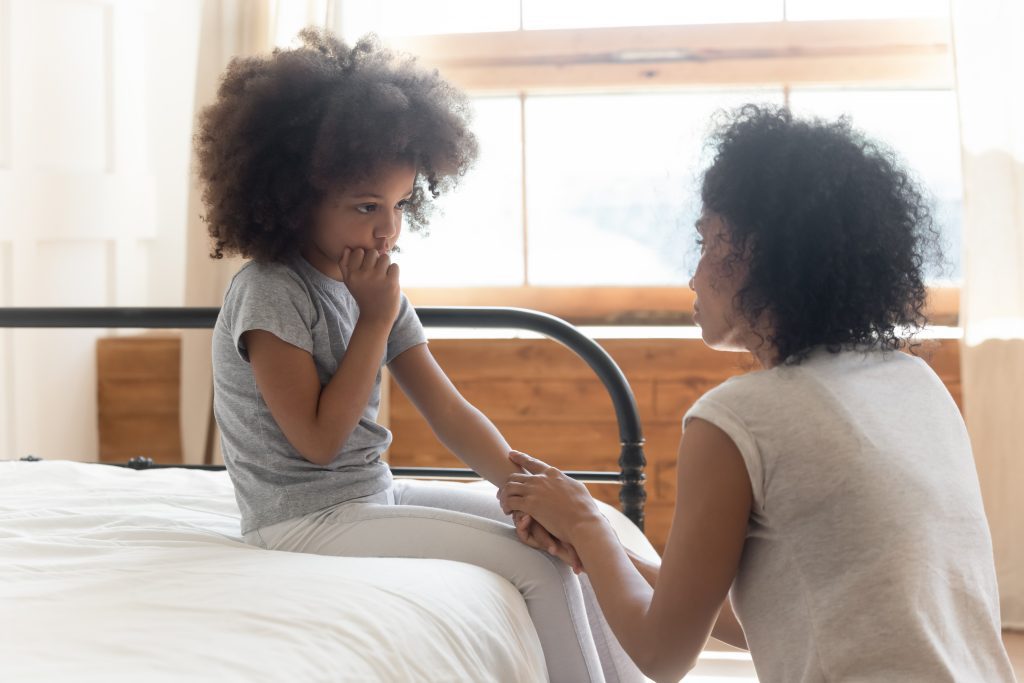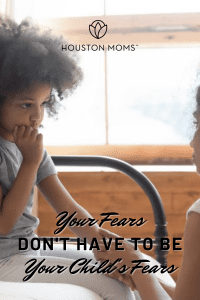We all want our children to inherit certain traits from us, such as our looks and personality. But have we ever considered how our fears also carry over to our children?
There is nothing inherently wrong with having fears; we all have them. Sometimes they are connected to something tangible, like airplanes, or associated with body image. Sometimes we have fears that are less than rational, such as the fear of lizards, {just trust me about the lizards}. Whatever they are, fears are a real part of life.
Fear is Universal
Some children are afraid of monsters under their beds, and teenagers often fear appearing unpopular. Most childhood fears disappear with age, but what if those that linger match our own? Children constantly absorb information, and our fears are no exception.
 Witnessing a parent in a state of fear can be unsettling for children. Kids look to parents for direction on how to interpret situations and if a parent seems scared, then it makes sense a child would view that situation or thing as unsafe. We cannot just stop fearing something, but for our children to begin to overcome fears, we must verbalize and be willing to talk to our children about them.
Witnessing a parent in a state of fear can be unsettling for children. Kids look to parents for direction on how to interpret situations and if a parent seems scared, then it makes sense a child would view that situation or thing as unsafe. We cannot just stop fearing something, but for our children to begin to overcome fears, we must verbalize and be willing to talk to our children about them.
Do Not Get Bogged Down by Guilt
Recognizing your own fears in your child brings up a lot of feelings, including guilt. When you notice your child exhibiting fearful behavior, do not be consumed with guilt. Our fears are real, and since they are real, we should not feel guilty about them. It is not about ignoring the guilt, but not letting it overwhelm our ability to help our child process their fears.
As parents, first recognize your fear and guilt, then you can focus on your child’s fear and how they are reacting. It is the same as the preflight safety instructions on an airplane. Adults put oxygen masks on first because we are no good to others if we have not taken care of ourselves. It is only after we recognize our fears and emotions, that we can successfully begin talking to our children about their fears and emotions.
Talk to Your Child About Your Fears
No one wants to talk about their fears. It brings up feelings associated with them. In the same way our children pick up on how we react to situations, they also learn from us how to talk about hard situations. It is our cues and actions that show them the power in talking about fears and it gives us space to process while we are helping them as well.
 We need to be honest with our children when we are scared. This is how they know it is normal to have fears and it shows the value of talking about emotions. When we are scared, our children pick up on it, and we do them a disservice if we pretend otherwise. To help them handle their fears, they deserve us honestly telling them when we are scared. We do not have to go into detail but tell them you are scared and what scared you, assure them you are going to be ok, and help them see how you are working to achieve calmness. When we do these steps, our children see us being honest about something they too are experiencing and it gives them the courage to talk about their fears.
We need to be honest with our children when we are scared. This is how they know it is normal to have fears and it shows the value of talking about emotions. When we are scared, our children pick up on it, and we do them a disservice if we pretend otherwise. To help them handle their fears, they deserve us honestly telling them when we are scared. We do not have to go into detail but tell them you are scared and what scared you, assure them you are going to be ok, and help them see how you are working to achieve calmness. When we do these steps, our children see us being honest about something they too are experiencing and it gives them the courage to talk about their fears.
Getting Your Child to Talk About Their Fears
When you notice your child is scared, avoid telling them there is nothing to fear. As adults, we do not like it when someone tells us this and children are the same. Their fear is just as real as yours and children need to be able to acknowledge and talk about their fears just as much as adults do. Encourage them to talk about their fear, use your own as an example as a prompt them to talk about theirs. The easiest way to start this kind of conversation is by asking simple questions.
What exactly are they scared of? What do they think is going to happen? What about this situation or thing frightens them? These questions get their brains thinking logically so they can begin to process the situation and break down the reality of the fear. Asking them questions that have detailed answers, challenges their thought process by encouraging them to think through how likely it is for their fear to happen or cause them harm.
These questions can also help us process our fears too. What might begin with you asking questions to them, can easily turn into you providing answers to the same questions and in turn achieving calmness for yourself and a great example for them.
What happens is in the process of you conversing with your child about their fears, you are also processing your own fears. You might not overcome them, but the next time you see your fear in your child you will be ready to help yourself and them.


















